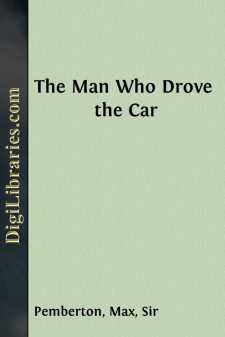Categories
- Antiques & Collectibles 13
- Architecture 36
- Art 48
- Bibles 22
- Biography & Autobiography 813
- Body, Mind & Spirit 142
- Business & Economics 28
- Children's Books 17
- Children's Fiction 14
- Computers 4
- Cooking 94
- Crafts & Hobbies 4
- Drama 346
- Education 46
- Family & Relationships 57
- Fiction 11829
- Games 19
- Gardening 17
- Health & Fitness 34
- History 1377
- House & Home 1
- Humor 147
- Juvenile Fiction 1873
- Juvenile Nonfiction 202
- Language Arts & Disciplines 88
- Law 16
- Literary Collections 686
- Literary Criticism 179
- Mathematics 13
- Medical 41
- Music 40
- Nature 179
- Non-Classifiable 1768
- Performing Arts 7
- Periodicals 1453
- Philosophy 64
- Photography 2
- Poetry 896
- Political Science 203
- Psychology 42
- Reference 154
- Religion 513
- Science 126
- Self-Help 84
- Social Science 81
- Sports & Recreation 34
- Study Aids 3
- Technology & Engineering 59
- Transportation 23
- Travel 463
- True Crime 29
Aladdin of London or, Lodestar
by: Max Pemberton
Description:
Excerpt
CHAPTER I
THE HALL BY UNION STREET
The orator was not eloquent; but he had told a human story and all listened with respect. When he paused and looked upward it seemed to many that a light of justice shone upon his haggard face while the tears rolled unwiped down his ragged jerkin. His lank, unkempt hair, caught by the draught from the open doors at the far end of the hall, streamed behind him in grotesque profusion. His hands were clenched and his lips compressed. That which he had told to the sea of questioning faces below him was the story of his life. The name which he had uttered with an oath upon his lips was the name of the man who had deprived him of riches and of liberty. When he essayed to add a woman's name and to speak of the wrongs which had been done her, the power of utterance left him in an instant and he stood there gasping, his eyes toward the light which none but he could see; a prayer of gratitude upon his lips because he had found the man and would repay.
Look down upon this audience and you shall see a heterogeneous assembly such as London alone of the cities can show you. The hall is a crazy building enough, not a hundred yards from the Commercial Road at Whitechapel. The time is the spring of the year 1903—the hour is eight o'clock at night. Ostensibly a meeting to discuss the news which had come that day from the chiefs of the Revolutionaries in Warsaw, the discussion had been diverted, as such discussions invariably are, to a recital of personal wrongs and of individual resolutions—even to mad talk of the conquest of the world and the crowning of King Anarchy. And to this the wild Asiatics and the sad-faced Poles listened alike with rare murmurs and odd contortions of limbs and body. Let Paul Boriskoff of Minsk be the orator and they knew that the red flag would fly. But never before has Boriskoff been seen in tears and the spectacle enchained their attention as no mere rhetoric could have done.
A man's confession, if it be honest, must ever be a profoundly interesting document. Boriskoff, the Pole, did not hold these people spellbound by the vigor of his denunciation or the rhythmic chant of his anger. He had begun in a quiet voice, welcoming the news from Warsaw and the account of the assassination of the Deputy Governor Lebinsky. From that he passed to the old question, why does authority remain in any city at all? This London that sleeps so securely, does it ever awake to remember the unnumbered hosts which pitch their tents in the courts and alleys of Whitechapel? "Put rifles into the hands of a hundred thousand men who can be found to-night," he had said, "and where is your British Government to-morrow? The police—they would be but as dead leaves under the feet of a mighty multitude. The soldiers! Friends," he put it to them, "do you ever ask yourselves how many soldiers there are in the barracks of London to-night and what would happen to them if the people were armed? I say to you that the house would fall as a house of cards; the rich would flee; the poor would reign. And you who know this for a truth, what do you answer to me? That London harbors you, that London feeds you—aye, with the food of swine in the kennels of the dogs."
Men nodded their heads to this and some of the women tittered behind their ragged shawls. They had heard it all so often—the grand assault by numbers; the rifle shots ringing out in the sleeping streets by Piccadilly; the sack of Park Lane; the flight of the Government; the downfall of what is and the establishment of what might be. If they believed it possible, they had sense enough to remember that a sacked city of amnesty would be the poorest tribute to their own sagacity. At least London did not flog them. Their wives and sisters were not here dragged to the police stations to be brutally lashed at the command of any underling they had offended. Applause for Boriskoff and his sound and fury might be interpreted as a concession to their vanity. "We could do all this," they seemed to say; "if we forbear, let London be grateful." As for Boriskoff, he had talked so many times in such a strain that a sudden change in voice and matter surprised them beyond words....





